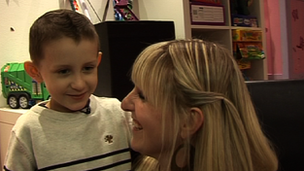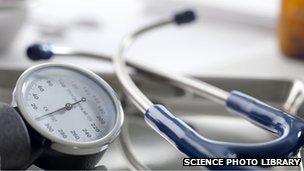Child cancer drug 'postcode lottery' revealed
- Published
The £65,000 cost of a new antibody treatment for one of the deadliest forms of childhood cancer means some NHS primary care trusts are funding it while others say no
A "postcode lottery" is seeing some children denied a life-saving cancer treatment merely because of where they live.
Doctors in Germany and the US are pioneering a new antibody treatment for neuroblastoma, one of the deadliest forms of childhood cancer.
The treatment gives a 20% increased chance of survival.
But the cost of £65,000 means some NHS primary care trusts are funding it for children while others say no.
The treatment teaches the body's own antibodies to attack and destroy tumours.
This shrinks them until they are small enough to be removed.
It has saved the lives of children whose tumours were previously inoperable.
Remortgaging homes
But with the need to manage budgets, some NHS Trusts are ignoring the advice of Great Ormond Street cancer specialists and refusing to pay for the life-saving treatments abroad.
Desperate parents are remortgaging homes or falling into tens of thousands of pounds of debt to buy the treatment - which has a one-in-five chance of making any difference.
One patient is six-year-old Aarin Bhatt, who lives in Hounslow, west London. BBC Inside Out has followed his case for more than a year.
A tumour had entwined Aarin's vital organs so thoroughly an operation was impossible.
After 15 rounds of chemotherapy failed, his doctor asked Hounslow PCT to pay for the treatment in a last-ditch attempt to save his life.
The PCT said no.
Aarin's mother Rachna Bhatt said at the time: "All he knows is doctors, nurses, hospitals - nothing normal.
"He doesn't have friends. He doesn't have anything."
'Life and death'
Nehal Bhatt, Aarin's father, said: "The PCT refused our funding application in spite of the best consultants in the country telling them to fund it.
"The tumour was still there in him. Every day was precious."
He went on: "It was life and death with regards to getting the antibody treatment.
"It was showing results everywhere and [there was] no reason why our little boy shouldn't have it."

Sarah Power is fundraising for her son Connor as a contingency plan
And yet Adam Bird, a little boy who lives just 20 miles away from Aarin, had his treatment funded by NHS Surrey.
Dr Penelope Brock, of Great Ormond Street Hospital (GOSH), called it a "postcode lottery". She said of the treatment: "These results are fantastic, [the] best results we have had in decades for neuroblastoma.
"It clearly works.
"We are extremely hopeful that this is going to improve outcomes for patients like Aarin."
She added: "I think the position of parents is awful."
Charity intervention
But Aarin has been able to receive the treatment despite the lack of NHS funding.
Neuroblastoma Alliance, a small charity in Brent, managed to raise the £65,000 Aarin's parents needed and he received his treatment in Germany.
It worked.
The BBC was there as Edward Kiley, a surgeon at GOSH, told his parents: "To me it [the tumour] looks a little bit smaller.
"If we can take the tumour out we believe it gives him an increased chance of coming through this.
"When I operated on him last year I couldn't do it."
And Inside Out also witnessed the moment when - after 10 hours of surgery - Mr Kiley told his parents: "All fine - we've taken out all [the cancer] we could see."
Members of his family wept with joy and relief.
The tumour was gone. And Aarin is now in remission.
Hounslow PCT declined to be interviewed on its decision to refuse him the treatment that looks to have saved his life.
But it released a statement which said: "The NHS considers each individual request for funding on a case by case basis.
"On this occasion NHS Hounslow reached the decision that it was not able to fund the treatment for Aarin.
"We are delighted Aarin continues to make good progress and wish him all the best for the future."
Other neuroblastoma families being treated at Great Ormond Street have said they are so frightened by the "lottery" they have started raising funds before the child is officially recommended to try the therapy, just in case.
'Left stranded'
That is the situation for Sarah Power and Rik Whipp, parents of five-year-old Connor.
Ms Power said: "We don't have any collateral - no house, no savings. We have nothing.
"We're fundraising for worst case scenario that if it did come back we've got options and we are not left stranded with no money, no time.
"As a parent you are panicked and you don't want to miss a trick."
The UK has set up its own antibody trial - but it is not the same as the ones already delivering results abroad.

Aarin's parents say for much of his life all he has known is hospitals, doctors, and nurses
And some patients, such as Aarin, are not even eligible.
The NHS's National Cancer Director declined to be interviewed.
A Department of Health spokesperson said: "It is very distressing for any parent to learn that their child has cancer.
"That's why we want to give every child affected by this devastating disease the best chance of beating it by ensuring they have access to specialist oncology centres and clinical research trials.
"All UK patients with high risk neuroblastoma can now get access to immunotherapy treatment through clinical trials in this country.
"Where a treatment is not available in a trial and there is no NICE guidance, funding decisions should be made by local health organisations based on an assessment of the available evidence and taking account of individual circumstances."
Alison Moy, of Neuroblastoma Alliance, said of the lottery: "It's really unfair and quiet cruel.
"Relatively few children need this help.
"This country should be supporting them in the way that other Scandinavian and European countries support their children to get the treatment."
Mr Bhatt added: "Funding is always tough, but when it comes to cancer care it's a matter of life and death - especially for children - they have their whole lives ahead of them and any treatment that gives them a fair chance at life has to be given priority."
BBC Inside Out is on BBC One in the London region on Monday, 12 November at 19:30 GMT and nationwide on the iPlayer for seven days thereafter.
- Published8 October 2012
- Published26 June 2012
- Published28 May 2012
- Published13 December 2011